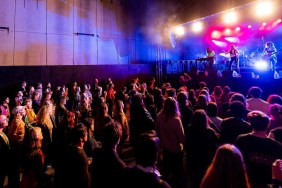Modeselektor (Gernot Bronsert and Sebastian Szary) and Apparat (Sascha Ring) feel slightly more comfortable working with each other on II, their second album under the hybrid moniker Moderat. The three Berlin-based producers, alongside contemporaries like Burial, Lapalux and Flying Lotus, continue to highlight the culture of collaboration which exists within the paradigm of modern electronic music. Whilst the combinational name Moderat suggests the merging of two unique sounds – the extroverted and glitchy beat production of Modeselektor with the introverted and atmospheric sound design of Apparat – it’s still clear which of Moderat’s musical elements are driven by which side of its musical equation. That said, II is still Moderat’s most consistent work to date, and the group now seem more like a band and less like an opportunistic experiment.
Moderat was never going to be a trouble-free collaboration. Its two sides hold noticeably contrasting styles, so sonic negotiation has always been a necessary evil. The seven years between their 2002 EP and the release of their somewhat inconsistent debut album in 2009 remains testament to this. As a follow-up, II is more robust and coherent, and proves that the sounds of Modeselektor and Apparat can be complimentary, if only after a great deal of give and take.
Despite having a more consistent aesthetic, II can also be quite dynamic, dramatic even. The heavenly synth reverberation of lead track The Mark (Interlude) collapses into the grimy synth lines and tripping dance rhythms of Bad Kingdom, before being revived to carry the song’s crisp chorus on a bed of airy synth swelling. The incorporation of some emotive vocals from Ring adds a layer of humanity which was missing from the group’s debut album, and provides some thematic anchorage throughout.
Whilst there’s a hint of pop under many of Moderat’s melodies, II does have its more progressive phases. The krautrock pulse of minimal techno track Milk echoes the recent work of Jon Hopkins with its similarly extended grooves and trance-like soundscape. Ilona, with its dub bass line, throbbing rhythms and layers of affected vocals, conjures a dark James Blake vibe, but with those haunting Moderat after-touches.
There are times when the Moderat collaboration doesn’t lead to such depth, though. The overly repetitive grooves of Therapy, whilst probably designed to evoke some sort of therapeutic renewal, feel heavy and grow increasingly dull. Therapy, like only a few other spots on II, reestablishes boundaries between the differents aesthetic of Modeselektor and Apparat, making each individual style more apparent.
Collaboration, whilst forever exciting and now deeply ingrained within electronic music culture, is rarely straightforward or risk-free. It can, however, be immensely rewarding, especially when those who aren’t pure-bred electro-heads end up working with those who are. With three influential electronic producers being involved in Moderat, the group’s unsteady progression is partly the result of too many cooks in the kitchen. II is a more steady foot forward, as it blurs the line between Modeselektor and Apparat, promoting the formulation of a more solid and attractive sound. It still doesn’t push many boundaries though, so whether or not Moderat are better than the sum of their parts remains up for debate.
Watch: Moderat interview for Eastern Electrics Festival 2013












